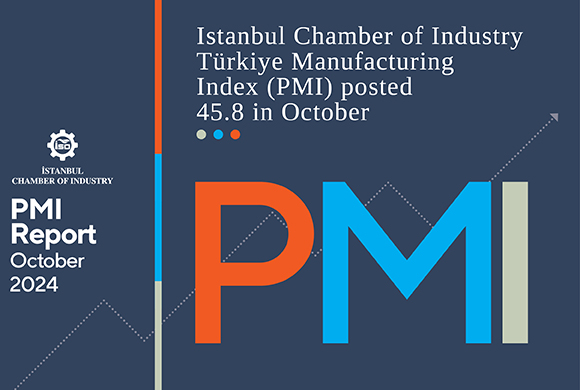News
ICI Released October 2024 Türkiye Manufacturing PMI and Türkiye Sector PMI Report
- 01.11.2024
- News

The headline PMI posted 45.8 in October, below the 50.0 nochange mark and therefore signalling a moderation of business conditions during the month. The health of the sector has eased in each survey period since April. Market conditions remained challenging, leading to muted demand and further slowdowns in total new orders and exports.
According to the Istanbul Chamber of Industry Türkiye Sector PMI report in October, Turkish manufacturing sector continued to face a challenging business conditions in general. The only sector recording positive developments was again the food products where output, new orders and staffing levels started to grow again. Input costs continued to rise sharply in general.
Istanbul Chamber of Industry (ICI) released the October 2024 results of Türkiye Manufacturing PMI (Purchasing Managers’ Index) survey, which is recognized as the fastest and reliable indicator of the manufacturing industry’s performance in the economic growth. According to the survey results where any figure greater than 50.0 indicates overall improvement of the sector, the headline PMI posted 45.8 in October, up from 44.3 in September but still below the 50.0 nochange mark and therefore signalling a moderation of business conditions during the month. The health of the sector has eased in each survey period since April. Market conditions remained challenging, leading to muted demand and further slowdowns in total new orders and exports. In turn, manufacturers scaled back production for the seventh month running. In all cases, however, rates of moderation softened from September. Employment and purchasing activity were also scaled back in response to muted new orders, although in some cases firms reported that voluntary resignations had caused a drop in staffing levels. Meanwhile, stocks of purchases decreased to the largest extent since May 2020.
Inflationary pressures continued to soften at the start of the final quarter of the year. Input costs rose markedly, but at the softest pace for almost a year and-a-half. The pace of output price inflation also eased. Currency weakness remained a key factor leading to higher costs. Meanwhile, higher prices for raw materials such as wheat were mentioned, alongside increased transportation costs.
Finally, suppliers' delivery times lengthened in October following a first improvement in vendor performance for nine months during September. Latest data signalled only a modest lengthening of lead times, however.
Commenting on the Istanbul Chamber of Industry Türkiye Manufacturing PMI survey data, Andrew Harker, Economics Director at S&P Global Market Intelligence, said:
"Although rates of moderation in a range of key variables such as output, new orders and employment softened in October, the latest data showed that the Turkish manufacturing sector remained under pressure due to challenging demand conditions. Notably, firms scaled back their holdings of inputs to the largest extent in almost four-and-a-half years. On a more positive note, inflationary pressures eased again, at least reducing the impact of this particular headwind to growth.”
Output decreased in all sectors except food products
According to the October Istanbul Chamber of Industry Türkiye Sector PMI report, output decreased in nine of the 10 sectors monitored, with the only exception being food products sector. The sharpest slowdown in output was recorded in wood and paper products sector. It was also the highest contraction in this sector since the first wave of the Covid-19 pandemic in 2020. Similarly, the only sector that recorded an increase in new orders was food products, while the sharpest decline was observed in clothing and leather products sector.
New export orders grew only in food products in October, after showing relatively positive signs in September with three sectors posting increases. The electrical and electronic equipment sector and the land and sea vehicles sector, on the other hand, started to slow down again. Due to the easing of workloads, manufacturers generally reduced their staffing levels going into the fourth quarter. Only the food products and chemicals, plastics and rubber sectors increased their staffing levels, while the sharpest decline was recorded in the textile sector. And the land and sea vehicles sector saw the sharpest decline in the survey's history. In October, input cost increases remained high in six of the 10 sectors monitored, albeit at a slower pace. The fastest rise in input prices was recorded in food products, while the slowest increase was recorded in chemicals, plastics and rubber. In the non-metallic mineral products sector, finished goods prices fell for the first time in nearly four and a half years amid efforts to stimulate demand. Selling prices in other sectors generally increased moderately. However, some sectors, particularly food products, which recorded the highest inflation in the last six months, continued to increase their finished goods prices significantly. Finally, suppliers' lead times shortened in October in only three of the ten sectors monitored. In September, this number was six.
*You can find attached the Istanbul Chamber of Industry Türkiye Manufacturing PMI and Sector PMI October 2024 reports.